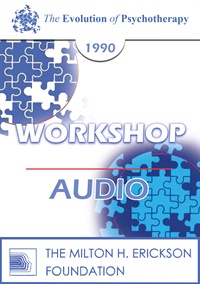EP90 Workshop 23 - Therapy of Sex Offenders and Their Victims - Cloe Madanes, Lic. Psychol.
- Average Rating:
- Not yet rated
- Topic Areas:
- Workshops | Psychotherapy | Sex and Sexuality | Children and Adolescent Therapy | Strategic Therapy
- Categories:
- Evolution of Psychotherapy | Evolution of Psychotherapy 1990 | Pioneers in Couples and Family Therapy
- Faculty:
- Cloe Madanes, HDL, LIC
- Duration:
- 1 Hour 49 Minutes
- Format:
- Audio Only
- Original Program Date:
- Dec 14, 1990
- License:
- Never Expires.
Description
Description: This presentation outlines a highly effective therapeutic method for rehabilitating juvenile sex offenders and protecting victims, with nearly a 100% success rate across 85–90 cases. Core components include full family involvement, open disclosure, sincere repentance, and assigning a protector for the victim. The approach addresses spiritual pain, avoids secrecy, and adapts to complex family dynamics. It integrates with legal and protective systems, balances compassion with accountability, and uses group therapy to build social responsibility among teens.
Syllabus Description: Cloe Madanes will discuss some of the varieties of abuse which can occur in a family, with an emphasis on incest and sexual abuse. A method for dealing with such situations will be presented and illustrated with a videotape.
Educational Objectives:
- To learn ways to deal with violent and sexual abuse problems
- To learn a set of therapy stages for sexual abuse problems
*Sessions may be edited for content and to preserve confidentiality*
Credits
Handouts
| Timestamped Transcript (1.2 MB) | 32 Pages | Available after Purchase |
| Ericksonian Learning Snapshot (276.3 KB) | 3 Pages | Available after Purchase |
Faculty

Cloe Madanes, HDL, LIC Related Seminars and Products
Cloé Madanes, HDL, LIC, is a world-renowned innovator and teacher of family and strategic therapy and one of the originators of the strategic approach to family therapy. She has authored seven books that are classics in the field: Strategic Family Therapy; Behind the One-Way Mirror; Sex, Love and Violence; The Violence of Men; The Secret Meaning of Money; The Therapist as Humanist, Social Activist and Systemic Thinker; and Relationship Breakthrough. She has presented her work at professional conferences all over the world and has given keynote addresses for The Evolution of Psychotherapy Conference, the American Association of Marriage and Family Therapy; the National Association of Social Workers, The Erickson Foundation, the California Psychological Association and many other national and international conferences. Madanes has won several awards for distinguished contribution to psychology and has counseled outstanding individuals from all walks of life.


